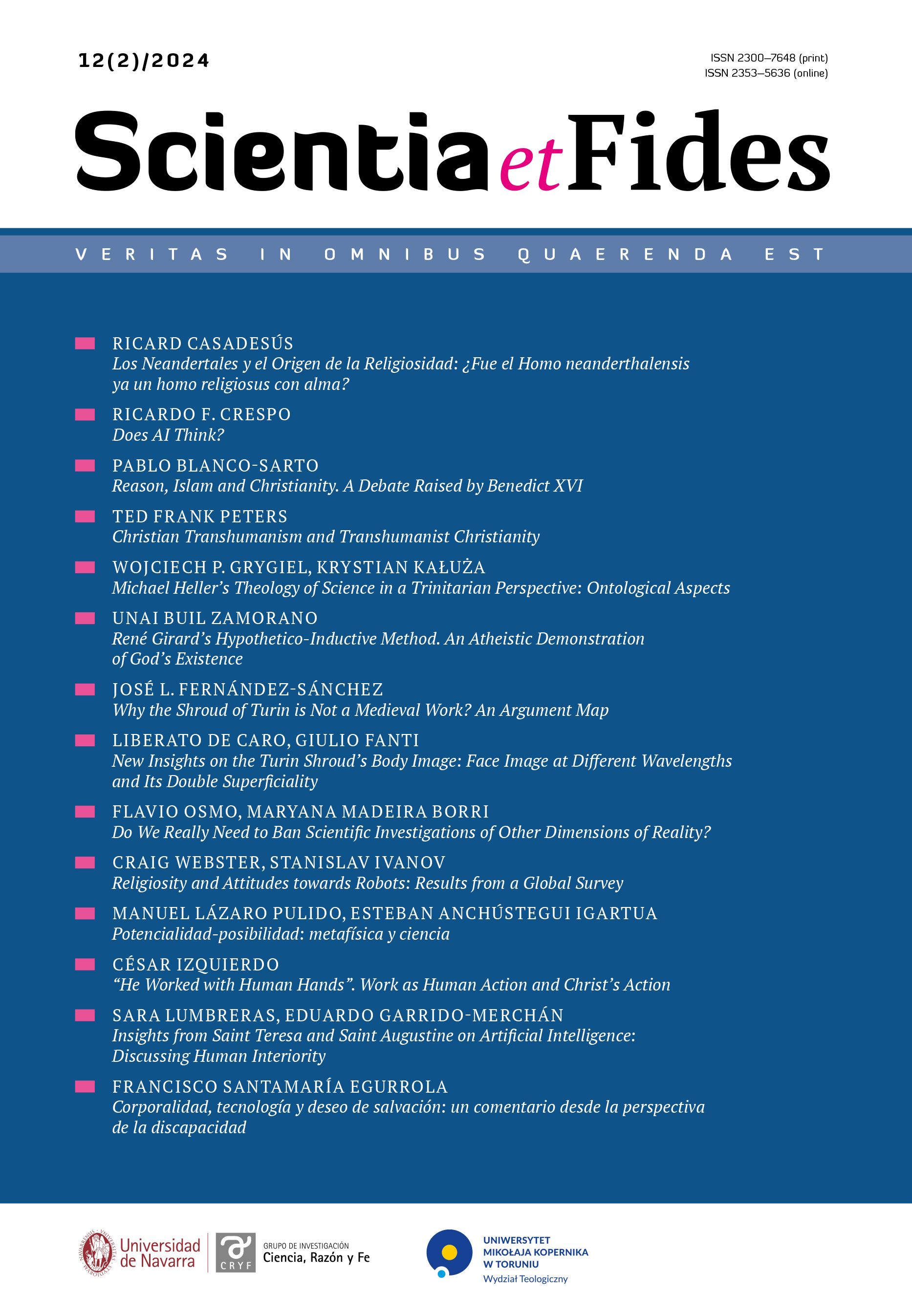Do We Really Need to Ban Scientific Investigations of Other Dimensions of Reality?
DOI:
https://doi.org/10.12775/SetF.2024.021Słowa kluczowe
philosophy of science, materialism, mind-body dualism, pragmatism, epistemology, ontologyAbstrakt
The purpose of this article is to offer arguments in favor of doing broad science, which means focusing on the investigation of everything, supported by the elaboration and application of methods that make it possible to objectify reality, which includes the attempt to replicate evidence likely to come from a transcendent reality. We argue that doing broad science depends on adopting the assumption that there are other dimensions of reality since this broadens the horizon of investigation; and to take care that such assumption does not come to be left out due to the influence of intrusive lines of thought of the most diverse. Here we discuss three lines of thought showing fragility in them, which we understand to be well established in current times, especially in the academic environment, and which directly or indirectly advocate the adoption of a materialist vision, namely: the disconnected psychophysical dualism, the myopic pragmatism, and the primacy of epistemology over ontology.
Bibliografia
Aristóteles. 2012. Metafísica. Translated by Edson Bini. São Paulo: Edipro.
Bunge, Mario A. 1981. Scientific Materialism. Dordrecht: D. Reidel Publishing Company.
Chalmers, David J. 2005. “The Matrix as Metaphysics.” In Philosophers Explore The Matrix, edited by Christopher Grau. Oxford: Oxford University Press.
Chalmers, David J. 2022. Reality+: Virtual Worlds and the Problems of Philosophy. New York: W. W. Norton & Company, Inc.
Fowers, Blaine J. 2015. The Evolution of Ethics: Human Sociality and the Emergence of Ethical Mindedness. London: Palgrave Macmillan.
Kant, Immanuel. 2020. Crítica da Razão Pura. Translated by Edson Bini. São Paulo: Edipro.
Lakatos, Imre. 1978. “Science and pseudoscience.” Philosophical papers 1: 1–7.
Lewin, Kurt. 1951. Field Theory in Social Science: Selected Theoretical Papers. New York: Harper.
Maslow, Abraham H. 1954. Motivation and Personality. New York: Harper & Row.
Mill, John S. 2017. Sobre a Liberdade e A Sujeição das Mulheres. Tanslated by Paulo Geiger. São Paulo: Companhia das Letras.
Nussbaum, Martha C. 1994. The Therapy of Desire: Theory and Practice in Hellenistic Ethics. Princeton: Princeton University Press.
Oddie, Graham. 2024. „Metaphysics.” Encyclopedia of Philosophy. Accessed May 7, 2024.
Osmo, Flavio. 2023. “Basic Evaluation Process and Some Associated Phenomena, such as Emotions and Reactive Defense of Beliefs.” Integrative Psychological and Behavioral Science 57(1): 205–34.
Pinker, Steven A. 2021. Rationality: What it is, why it seems scarce, why it matters. New York: Viking.
Reale, Giovanni. 1997. Para uma Nova Interpretação de Platão: Releitura da Metafísica dos Grandes Diálogos à Luz das “Doutrinas não-escritas”. Translated by Marcelo Perine. São Paulo: Edições Loyola.
Reale, Giovanni, and Dario Antíseri. 2003. História da Filosofia: Vol. 1: Filosofia Pagã Antiga. Translated by Ivo Storniolo. São Paulo: Editora Paulus.
Reale, Giovanni, and Dario Antíseri. 2004. História da Filosofia: Vol. 3: Do Humanismo a Descartes. Translated by Ivo Storniolo. São Paulo: Editora Paulus.
Reale, Giovanni, and Dario Antíseri. 2005. História da Filosofia: Vol. 4: De Spinoza a Kant. Translated by Ivo Storniolo. São Paulo: Editora Paulus.
Shermer, Michael B. 2011. The Believing Brain: From Ghosts and Gods to Politics and Conspiracies: How We Construct Beliefs and Reinforce them as Truths. New York: Henry Holt.
Trigg, Roger H. 2015. Beyond Matter: Why Science Needs Metaphysics. West Conshohocken: Templeton Press.
Pobrania
Opublikowane
Jak cytować
Numer
Dział
Licencja
Prawa autorskie (c) 2024 FLAVIO OSMO, Maryana Madeira Borri

Utwór dostępny jest na licencji Creative Commons Uznanie autorstwa – Bez utworów zależnych 4.0 Międzynarodowe.
CC BY ND 4.0. Posiadaczem prawa autorskiego (Licencjodawcą) jest Autor, który na mocy umowy licencyjnej udziela nieodpłatnie prawa do eksploatacji dzieła na polach wskazanych w umowie.
- Licencjodawca udziela Licencjobiorcy licencji niewyłącznej na korzystanie z Utworu/przedmiotu prawa pokrewnego w następujących polach eksploatacji: a) utrwalanie Utworu/przedmiotu prawa pokrewnego; b) reprodukowanie (zwielokrotnienie) Utworu/przedmiotu prawa pokrewnego drukiem i techniką cyfrową (e-book, audiobook); c) wprowadzania do obrotu egzemplarzy zwielokrotnionego Utworu/przedmiotu prawa pokrewnego; d) wprowadzenie Utworu/przedmiotu prawa pokrewnego do pamięci komputera; e) rozpowszechnianie utworu w wersji elektronicznej w formule open access na licencji Creative Commons (CC BY-ND 3.0) poprzez platformę cyfrową Wydawnictwa Naukowego UMK oraz repozytorium UMK.
- Korzystanie przez Licencjobiorcę z utrwalonego Utworu ww. polach nie jest ograniczone czasowo ilościowo i terytorialnie.
- Licencjodawca udziela Licencjobiorcy licencji do Utworu/przedmiotu prawa pokrewnego nieodpłatnie na czas nieokreślony
PEŁEN TEKST UMOWY LICENCYJNEJ >>
Statystyki
Liczba wyświetleń i pobrań: 314
Liczba cytowań: 0



